Archived Fire Damage Blog Posts
Your Heat Sources and Fire Risk | SERVPRO® of Rockwall/Rowlett
1/14/2025 (Permalink)
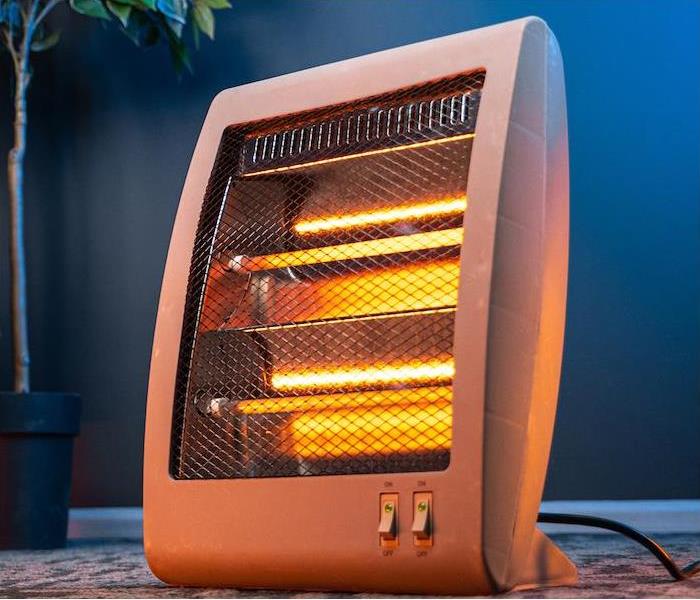 Call SERVPRO of Rockwall/Rowlett if you experience any smoke, soot or fire damage.
Call SERVPRO of Rockwall/Rowlett if you experience any smoke, soot or fire damage.
The temperatures have dipped and we have seen our share of windy and frigid days already this season. There’s no doubt about it—winter has arrived in northern Texas. Now that we are spending more time indoors, most of us have probably turned on our furnaces or utilized our fireplaces.
Since house fires are more common in the winter season, it is important to keep your sources of heat well-maintained and cleaned to avoid starting an accidental fire. We lay out some great ways to reduce your risk of a house fire below, so read on.
Clean Your Furnace
Most homeowners will probably admit that they don’t clean their HVAC systems as often as they should. Even though our furnaces and air conditioning units are used heavily in our homes, they are typically overlooked on a day-to-day basis.
Inspect your furnace regularly to detect any issues or potential malfunctions. The next time we experience a freak snowstorm, you certainly don’t want that to be the time you discover that your furnace isn’t working.
In addition to giving it a good cleaning every season, you should also replace the air filter regularly. Ideally, this task should be done seasonally to provide your home with the best air quality. Every 90 days is a good benchmark to swap it out.
Even though this is a small and easy task, it can extend the lifespan of your HVAC system and can save you money and a potential headache down the road!
Prioritize a Clean Fireplace
If your home has a fireplace, you probably enjoy the warm benefits it can bring a few times a year. Since it may not be used very often, it is even more important that it is cleaned regularly to remove excess dust buildup. During cleaning, it is also a good idea to inspect it for cracks or potential issues.
If you have an artificial fireplace, remove the glass front and wipe down the entire interior of the unit and check to make sure all of the connecting gas or electric lines are in good condition. For wood-burning fireplaces, clearing out excess ash and ensuring the chimney is not blocked can help reduce your risk of starting a house fire.
Portable Heater Safety
If you need a quick blast of warmth, space heaters can be a great resource to have in your home. While they are an efficient source of heat for a single room or small space, they can also be fire hazards. Avoid accidental tipping of the unit by placing it on a level surface, and always plug it into the wall instead of an extension cord.
Children and pets can also increase your house fire risk if you use space heaters. Never leave them in a room unattended, and always unplug your heater before going to bed.
If you experience fire damage this season, give us a call at SERVPRO of Rockwall/Rowlett for immediate assistance. We’re here 24⁄7 when you need us!
Protect Your Home From Fire This Season | SERVPRO® of Rockwall/Rowlett
11/15/2022 (Permalink)
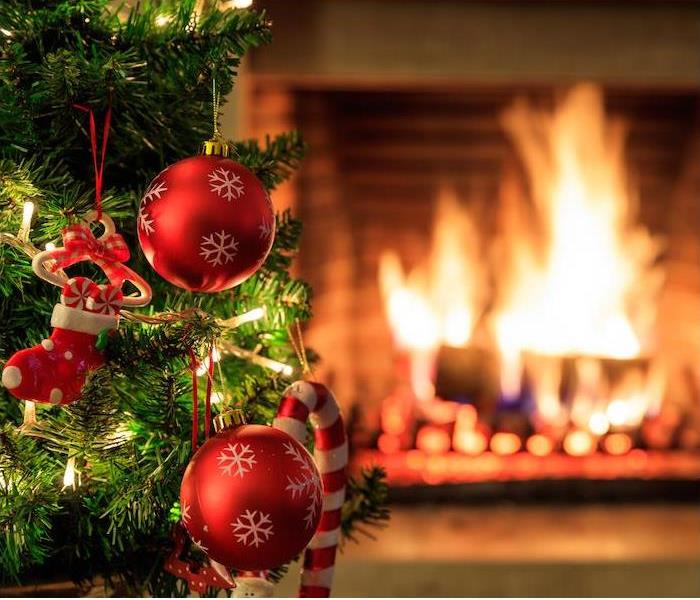 Should a fire issue pop-up during this holiday season, SERVPRO of Rockwall/Rowlett will be on call ready to assist.
Should a fire issue pop-up during this holiday season, SERVPRO of Rockwall/Rowlett will be on call ready to assist.
The holiday season is here! Cozy homes full of glowing lights, fresh pies and cookies, and our closest friends and family make this time of year so wonderful. Unfortunately, though, the coziness of this season actually leads to more home fires than any other time of year.
While you are busy writing out your letter to Santa or prepping for your first-ever Turkey Trot, it is important to remember proper safety practices when decorating and celebrating around the Allen area.
Fire risk is all around us during this wonderful time of year, so staying safe should be in the forefront of your mind as you plan for the holidays ahead.
Seasonal Hazards to Watch ForHouse fires due to decoration accidents are actually quite common. In fact, about 790 structural fires each year are due to decoration mishaps. Don’t let your beautiful home fall victim to a preventable accident!
If you hang stockings or garland, be careful to avoid any source of heat like space heaters or fireplaces. The consistent heat and flame can start a fire or melt your decorations.
If a real tree is your family tradition, have a responsible person in your home water it daily and sweep or vacuum up any dead needles on the ground around it. Your tree’s lights and other lighted decorations should also be unplugged each night before you head to bed.
Steps to TakeWhile classic decorations like hanging your stockings over the chimney are common and super cozy, they can actually be a fire hazard if you are not cautious. Try not to let them hang too close to the flames or choose a spot nearby instead.
Also be careful about your candle use! Candles start about 20 home fires every day in the United States, so it is especially important to only burn a candle while you are home and in the room. They should also only be lit in an area out of reach of children and pets.
Outdoor lights and decorations are also a great way to celebrate the holiday season! However, before you set up anything outside, make sure it is tagged for outdoor use and can withstand the elements. Don’t pierce any cords while hanging up your decorations, and avoid hanging anything right over a brush pile or wood.
Once you are finished decorating safely, make sure that your smoke detectors have fresh batteries and are working properly! Review your safety plan with your family and make sure your children know how to get out of your home quickly.
Finally, keep us in mind if you do end up suffering fire damage. Your SERVPRO of Rockwall/Rowlett team is ready to help should you need us this holiday season.
Have smoke or fire damage in your house? Contact us today to get cleaned up fast.
How to Avoid Furnace Fires | SERVPRO® of Rockwall/Rowlett
11/3/2021 (Permalink)
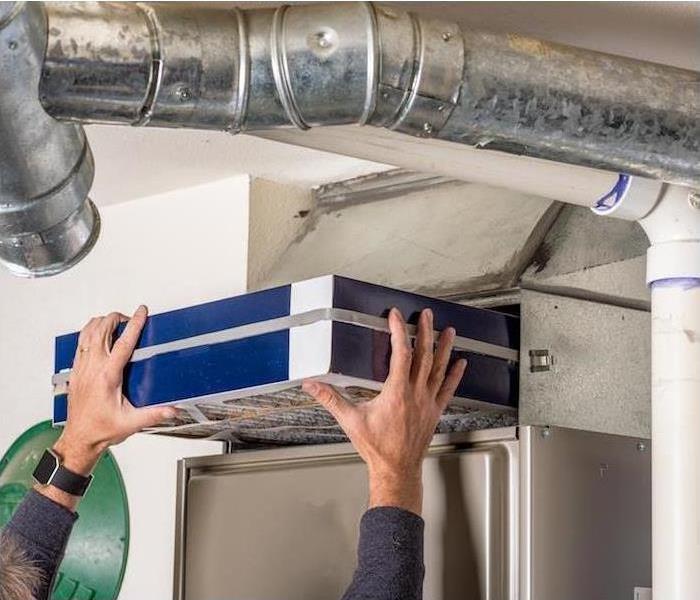 If you experience any property damage due to a fire, we are here to help. Contact SERVPRO of Rockwall/Rowlett to learn more.
If you experience any property damage due to a fire, we are here to help. Contact SERVPRO of Rockwall/Rowlett to learn more.
Wow! The temps have gotten cooler. With fall upon us, we may be thinking about cranking up our furnaces again. Waking up with toasty toes rather than a freezing nose has its temptations.
About 62 million houses in the U.S. use natural gas furnaces for heat. Other houses use wood furnaces, and a proud few still burn coal. These suggestions focus on gas furnaces, but it’s important to perform preventive maintenance on any type of furnace.
Clean-Up Time
Clean around the furnace. Do a quick clean-up, making sure no insulation, paper, boxes or anything else is stored within three feet of the furnace.
Clean the furnace itself. Dirt can cause motor overheating, and it can prevent you from seeing problems with wiring or other issues.
Look at Your Air Filter
Is your air filter clean? Dirty air filters can reduce air flow and lead to overheating, increasing the chances of fire.
Check Chimney Flues and Outside Vents
Check for buildup inside the vents, as well as outside obstructions such as birds’ nests.
Is Your Smoke Alarm Working?
It’s a good time to check both your smoke and CO alarms. If you don’t have them—get them.
For Some Things, You Need a Professional
Every year, it’s a good idea to have your furnace serviced by a professional. They can check for items such as a cracked heat exchanger, incorrect pressure in the furnace and even flame color, which can indicate how well your furnace is functioning. If you haven’t had your furnace serviced lately, this is a good time to make an appointment.
If your home has suffered fire damage, SERVPRO of Rockwall/Rowlett can help. Our agents are on call around the clock so we can start helping you get back to normal, fast. Contact us at any hour for assistance.
Two Types of Smoke
6/23/2021 (Permalink)
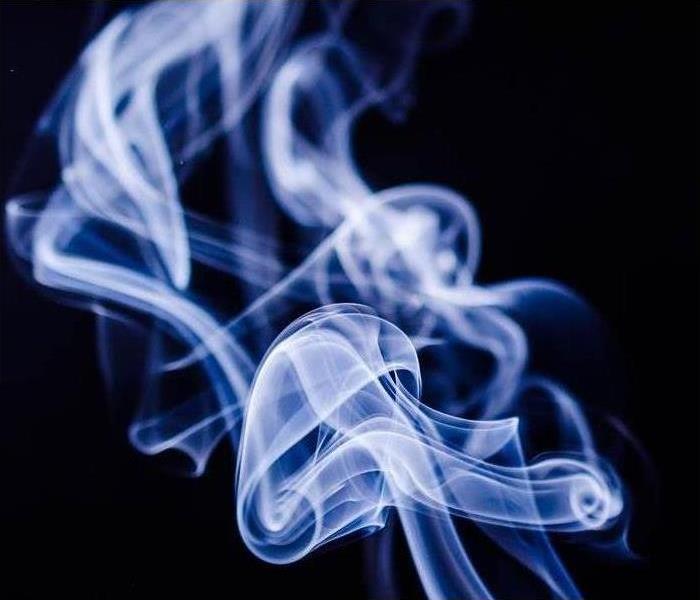 smoke rising in black background
smoke rising in black background
Did you know that there are two types of smoke? Well, there are!
The two types are wet and dry smoke:
Wet smoke comes from plastic and rubber, usually low heat or slow-burning fires. The smoke is black and thick with a strong odor and leaves a sticky and smeary residue on the walls, ceiling, and everything within the room. Smoke webs are more difficult to clean than dry smoke.
Dry smoke is usually fast burning, with high temperatures; the heat rises, which means the smoke does too!
SERVPRO of Rockwall/Rowlett are experienced in Fire and Smoke mitigation. We have the knowledge and training to get your home or business back to pre loss conditions. Give us a call, and let us help you with your fire or smoke damage!
Do You Have a Fire Extinguisher? Can You Use It? | SERVPRO® of Rockwall/Rowlett
12/11/2020 (Permalink)
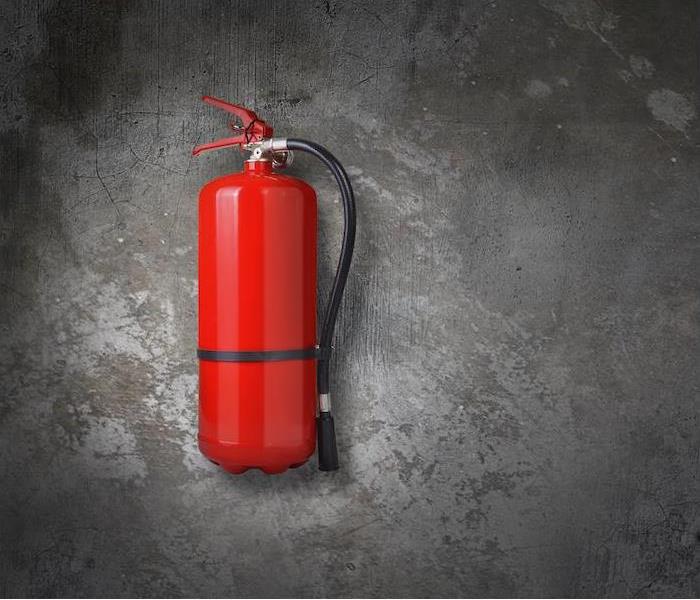 Fire can strike even the best-prepared business. Contact SERVPRO of Rockwall/Rowlett to discuss a SERVPRO® Emergency READY Profile for your business
Fire can strike even the best-prepared business. Contact SERVPRO of Rockwall/Rowlett to discuss a SERVPRO® Emergency READY Profile for your business
You hear hollering from the break room. One of your employees comes running down the hall—he just caught a bag of popcorn on fire in the microwave, panicked and threw it into the trash can. What next?
Clearly, your first line of defense is to grab the fire extinguisher and use it. But do you have a fire extinguisher? And does anyone know how to actually use it?
You Need Fire Extinguishers in Your Business
In fact, you’re required to have a fire extinguisher in almost every location type, including health care, manufacturing and assembly, day care, hotel or other overnight-stay, shops and storefronts, storage, and more.
Accessibility. Your fire extinguishers have to be accessible, meaning someone can handily grab one.
Visibility. Your fire extinguisher also has to be visible. If it’s tucked under the kitchen sink, signs need to direct people that it’s in there.
Types of Fire Extinguishers
Different businesses may need different fire extinguisher types. These include:
Type A is used for “ordinary combustibles.” This is fine if you have a typical office or shop.
Type B is for flammable liquids, such as paints or cooking oils.
Type C is for areas where you may have an electrical fire.
Type D is for areas where you may have combustible metals.
How to Use a Fire Extinguisher
A fire extinguisher can look scary, but it’s actually pretty simple (though messy) to use. First, pull the pin to break the tamper seal. Then aim the nozzle toward the base of the fire and squeeze. Sweep back and forth until the fire goes out. You may need to watch for a flare-up and use the fire extinguisher again if needed.
Make sure your employees know how to use their office fire extinguisher. A diagram like this one by OSHA can help people master the basics.
Fire can strike even the best-prepared business. To discuss a SERVPRO® Emergency READY Profile for your business, contact us at any hour for assistance.
How to Avoid Furnace Fires | SERVPRO® of Rockwall/Rowlett
9/25/2020 (Permalink)
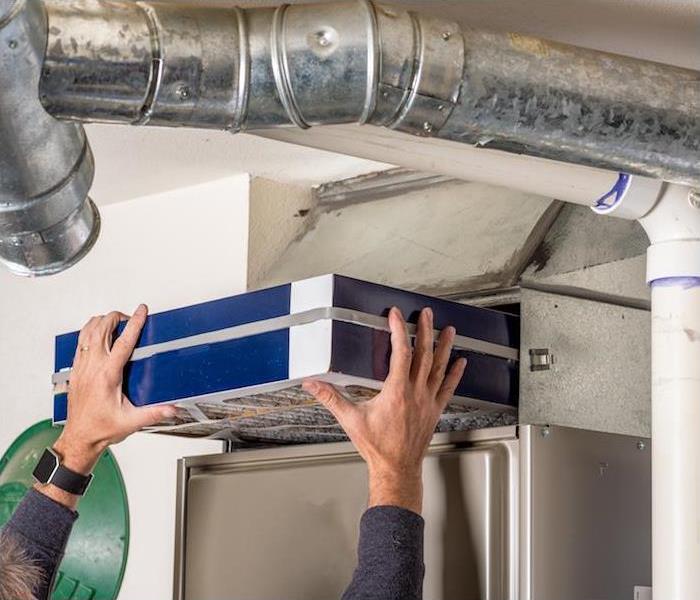 If you experience any property damage due to a fire, we are here to help. Contact SERVPRO of Rockwall/Rowlett to learn more.
If you experience any property damage due to a fire, we are here to help. Contact SERVPRO of Rockwall/Rowlett to learn more.
Wow! This summer has definitely been a warm one. But with fall upon us, we may be thinking about cranking up our furnaces again. Waking up with toasty toes rather than a freezing nose has its temptations.
About 62 million houses in the U.S. use natural gas furnaces for heat. Other houses use wood furnaces, and a proud few still burn coal. These suggestions focus on gas furnaces, but it’s important to perform preventive maintenance on any type of furnace.
Clean-Up Time
Clean around the furnace. Do a quick clean-up, making sure no insulation, paper, boxes or anything else is stored within three feet of the furnace.
Clean the furnace itself. Dirt can cause motor overheating, and it can prevent you from seeing problems with wiring or other issues.
Look at Your Air Filter
Is your air filter clean? Dirty air filters can reduce air flow and lead to overheating, increasing the chances of fire.
Check Chimney Flues and Outside Vents
Check for buildup inside the vents, as well as outside obstructions such as birds’ nests.
Is Your Smoke Alarm Working?
It’s a good time to check both your smoke and CO alarms. If you don’t have them—get them.
For Some Things, You Need a Professional
Every year, it’s a good idea to have your furnace serviced by a professional. They can check for items such as a cracked heat exchanger, incorrect pressure in the furnace and even flame color, which can indicate how well your furnace is functioning. If you haven’t had your furnace serviced lately, this is a good time to make an appointment.
If your home has suffered fire damage, SERVPRO of Rockwall/Rowlett can help. Our agents are on call around the clock so we can start helping you get back to normal, fast. Contact us at any hour for assistance.
Planning and Executing Workplace Fire Evacuation Drills | SERVPRO® of Rockwall/Rowlett
9/25/2020 (Permalink)
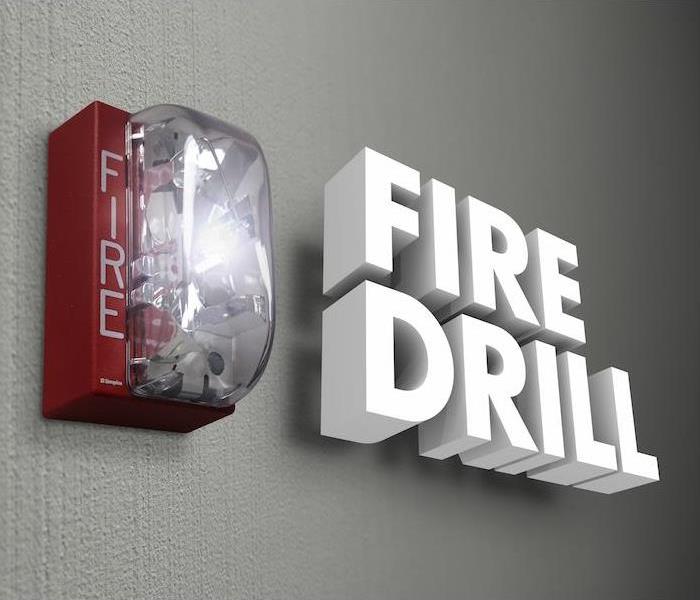 If your business experiences any fire damage, you can count on us. SERVPRO of Rockwall/Rowlett specializes in fire restoration.
If your business experiences any fire damage, you can count on us. SERVPRO of Rockwall/Rowlett specializes in fire restoration.
Understanding your business’ risk levels from a market perspective is key, but it is important to also understand the risk levels you face from disasters and emergencies. Fires at businesses occur every year, and for those who do not focus on lessening their impact, they can be devastating.
While there are many elements to fire safety in the workplace, we highly encourage businesses to start with what will keep their staff as safe as possible by creating a system for evacuation drills. These drills will not take up much time and will help your staff know exactly what to do if the fire alarm sounds.
Create a System for Evacuation Drills at Your Business
Consult with your local fire officials. There are many online resources available for business owners to do their research regarding fire safety, but do not forget about community resources as well. The local fire squad will likely be able to schedule a visit and provide you with valuable counsel regarding the best evacuation routes to set up based on the specifics of your building.
Communicate and mark fire evacuation routes. After you have decided what evacuation routes suit your needs, be sure they are labeled clearly and your staff is aware of the upcoming drill. Keeping everyone looped in will create more transparency and be sure every one of your staff members are prepared when the drill begins.
Have fire drills frequently. While it is possible to have drills too frequently, we generally find that the problem is not scheduling them often enough to make an impact. You should have them with enough regularity that they are fresh in everyone’s mind, so that even if a fire does start unexpectedly, everyone remembers exactly what the protocol is.
Run different fire scenarios. Fires can start and spread in a multitude of ways, especially in a commercial or office space. Keep your drills dynamic by taking this into account—have the drill begin in different spots around the office, so your staff can become accustomed to using different exits with little notice just as they would need to in a real fire.
If your business has experienced fire damage, you can count on us. We specialize in commercial fire restoration and will be here for you at any hour—contact us today.




 24/7 Emergency Service
24/7 Emergency Service






